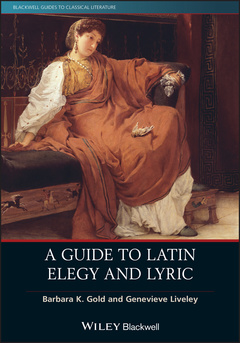A Guide to Latin Elegy and Lyric Blackwell Guides to Classical Literature Series
Auteurs : Gold Barbara K., Liveley Genevieve

Provides the necessary context to read elegiac and lyric poetry, designed for novice and experienced Classics and Latin students alike
A Guide to Latin Elegy and Lyric explores the language of Latin poetry while helping readers understand the socio-cultural context of the remarkable period of Roman literary history in which the poetry was composed. With an innovative approach to this important area of classical scholarship, the authors treat elegy alongside lyric as they cover topics such as the Hellenistic influences on Augustan poetry, the key figures that shaped the elegiac tradition of Rome, the motifs of militia amoris ("the warfare of love") and servitium amoris (?the slavery of love?) in Latin love elegy, and more.
Organized into ten chapters, the book begins with an introduction to the literary, political, and social contexts of the Augustan Age. The next six chapters each focus on an individual lyric and elegiac poet?Catullus, Horace, Tibullus, Propertius, Ovid, and Sulpicia?followed by a survey of several lesser-known poets and post-Augustan elegy and lyric. The text concludes with a discussion of major tropes and themes in Latin elegy and lyric, and an overview and analysis of key critical approaches in current scholarship. This volume:
- Includes full translations alongside the Latin throughout the text to illustrate discussions
- Analyzes recurring themes and tropes found in Latin poetry such as sexuality and gender, politics and patronage, myth and religion, wealth and poverty, empire, madness, magic, and witchcraft
- Reviews modern critical approaches to elegiac and lyric poetry including autobiographical realism, psychoanalysis, narratology, reception, and decolonization
- Includes helpful introductory sections: "How to Read a Latin Elegiac or Lyric Poem" and "How to Teach a Latin Elegiac and Lyric Poem"
- Provides information about each poet, an in-depth discussion of some of their poetry, and cultural and historical background
- Features a dedicated chapter on Sulpicia, offering readers an ancient female viewpoint on sex and gender, politics, and patronage
Part of the acclaimed Blackwell Guides to Classical Literature series, A Guide to Latin Elegy and Lyric is the perfect text for both introductory and advanced courses in Latin elegy and lyric, accessible for students reading the poetry in translation, as well as for those experienced in Latin with an interest in learning a different approach to the subject.
Preface vii
Introduction: How to Read and Teach a Latin Elegiac or Lyric Poem 1
1 The Literary, Political and Social Contexts of Latin Elegy and Lyric 7
2 Catullus 24
3 Horace 39
4 Tibullus 55
5 Propertius 70
6 Ovid 85
7 Sulpicia 100
8 Other Elegiac and Lyric Poets 110
9 Tropes and Themes in Elegy and Lyric 122
10 Critical Approaches to Elegiac and Lyric Poetry 137
Bibliography 152
Index 163
Barbara K. Gold is Edward North Professor Emerita at Hamilton College. She is the editor of Literary and Artistic Patronage in Ancient Rome, author of Literary Patronage in Greece and Rome, and co-editor of Sex and Gender in Medieval and Renaissance Texts: The Latin Tradition, and Roman Dining. She has published widely on satire, lyric and elegy, feminist theory, sex and gender, comedy, and late antiquity. Her Blackwell Companion to Roman Love Elegy was published in 2012, and Roman Literature, Gender and Reception: Domina Illustris (co-edited, Routledge) was published in 2013. Her latest book is Perpetua: Athlete of God (Oxford University Press, 2018).
Genevieve Liveley is Professor of Classics, RISCS Fellow, and Turing Fellow at the University of Bristol. She has particular research interests in ancient narratives and in narrative theories (both ancient and modern) and has published widely on this subject, mostly recently as the author of Narratology for OUP’s Classics in Theory series. She is also the author of two books on Ovid: A Reader's Guide to Ovid's Metamorphoses and Ovid’s Love Songs. She co-edited (with Patricia Salzman-Mitchell) Elegy and Narratology: Fragments of Story and her other publications include (among other topics) articles and essays on the classical tradition, chaos theory, and cyborgs.
Date de parution : 07-2021
Ouvrage de 192 p.
15.2x22.6 cm



